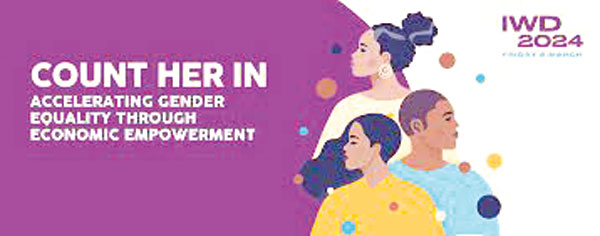As the world embraces a New Year and shifts focus to issues of better economy, poverty reduction and food security, among other important issues that affect life, YEJIDE GBENGA-OGUNDARE reports that for women globally, focus is still on inclusion.
It is a New Year and many are already making plans on their activities for the year and how to improve their lots. But for women globally, in spite of advocacy efforts of previous years, the conversation has not changed. And, in this New Year, the focus is still on inclusion and surrounding issues; equality among genders, empowerment, fighting violation of rights, a world free of bias, stereotypes, harmful cultural beliefs and practices as well as discrimination.
This year, women are still focused on a world that is not only diverse but also equitable and inclusive; a world where difference is valued and celebrated to collectively forge women’s equality.
And to buttress the conversation, this year’s International Women’s Day is focused on collectively inspiring inclusion for women with the theme, ‘Count Her In: Accelerating gender equality through economic empowerment.’
This year’s International Women’s Day; Friday, March 8, 2024, is a day that the world will focus on reshaping systems and removing barriers so that all women and girls can realise their full potential and build better financial future for all by celebrating women’s achievement and raising awareness on issues that concern women.
And worldwide, anyone can play an important part in their own chosen way because the International Women’s Day (IWD) belongs to everyone, everywhere and is not meant to be a one-way traffic event; indeed, all IWD activity is valid and that’s what makes IWD inclusive.
IWD as a campaign started collectively as a result of burning passion and tenacity for positive change in 1911. And today, it is the essence that ignites, inspires, directs and connects audiences globally in a one world, one mission movement to forge women’s equality.
IWD draws together and unifies all those who care deeply about women’s equality, who care about righting the wrongs, who care about doing what they can to help forge a gender-equal and inclusive world.
And, as massive as the story of women’s struggle for equality is and the collective efforts of all stakeholders that care about human rights, there has been little change. And this is why, in 2024, the conversation is yet to change and globally, women are still talking and fighting for inclusion and counting women in.
There is no right or wrong way to mark IWD. Just as we should never try to control how a woman can think, or what she can wear, or who she can be, or what she can say – do not let any group or individual criticise, invalidate or judge each other’s choice of IWD activity and narrative because diversity of activity and varied participation of all makes IWD inclusive and impactful.
Talking about gender issues, raising awareness, building solidarity, sharing different perspectives, offering support – are all key in the journey to women’s equality.
This year, activities are expected to focus on counting her in by examining the pathways to greater economic inclusion for women and girls everywhere as, despite great progress, women still face significant obstacles to achieving equal participation in the economy.
Without equal access to education, employment pathways, financial services and literacy, there is no way the world can reach gender equality.
And also in line with the vision of inclusion, the International Day of the Girl Child 2024, in line with the vision of highlighting the challenges faced by girls around the world and promoting their empowerment, education and rights, will promote the rights and wellbeing of girls worldwide by emphasising the importance of empowering girls through education, access to healthcare and protection from violence as well as discrimination and, in essence, create for them a platform for inclusion that will make them important in decision making.
This day will also encourage girls to dream big, pursue their goals and contribute to building a more equitable and just world.
The International Day of the Girl Child was established by the United Nations General Assembly in 2011 to recognise the unique challenges girls face worldwide and to promote their rights. It emerged from the global women’s rights movement and the need to address gender disparities and discrimination that affect girls’ lives.
And since its inception, International Day of the Girl Child has gained momentum, with various organisations and advocates working together to empower girls, eliminate gender-based violence and ensure equal opportunities for all children.




